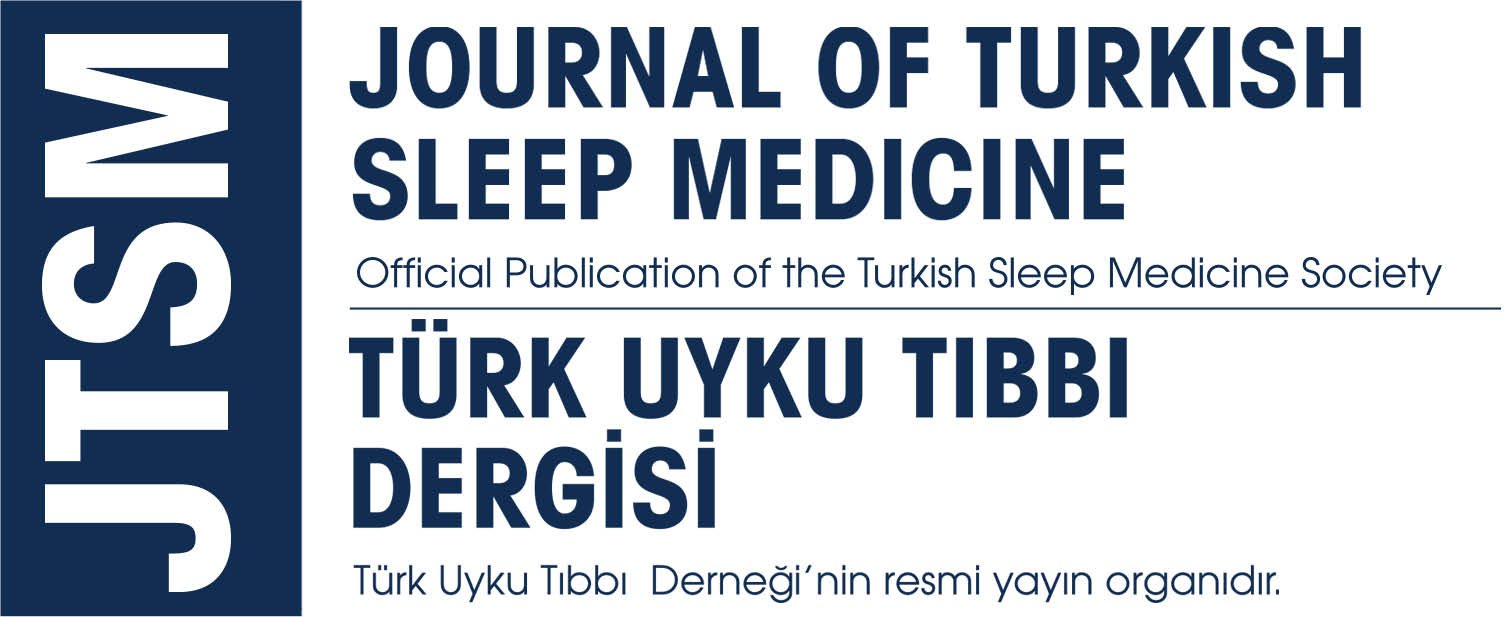ABSTRACT
Objective:
Sleep is crucial for healthy growth and development of children. Unsuitable television viewing habits are one of the important factors that disturb sleep patterns. This study was conducted to evaluate the sleep and television viewing habits of primary school students.
Materials and Methods:
The study was conducted as a descriptive study. The data were collected from parents of students aged 6-11 years, who were studying at a primary school between December 2016 and February 2017. The study sample consisted of 299 parents. In order to collect data, a personal information form, an information form to determine television viewing habits and the Children’s Sleeping Habits Questionnaire were administered to the study subjects. Percentages, means, standard deviations, frequencies, and analysis of variance were used to evaluate the data. Ethical permission and consent from the parents were taken for conducting the study.
Results:
The mean age of the children was 8.64±1.16, and the parents’ mean age was 35.55±6.23. The mean number of hours spent viewing television was 5.62 hours per day. The mean sleep time of the children was 9.37 hours. The mean total score obtained from Children’s Sleeping Habits Questionnaire was determined to be 47.92±8.18.
Conclusion:
It was found that the child’s success at school, the television viewing time during the weekday, the child’s preference for viewing time, the response to being asked to turn the television off, and the parents’ viewing time significantly affected the total Children’s Sleeping Habits Questionnaire score. A significant difference was found between parental income status, educational status, school success, bedtime resistance, and sleep duration. Also, a significant difference was found between television viewing habits and at least one sleep problem, except night wakes.
Keywords:
Child, television, sleep problems, nurse
References
1Öncel S, Akcan A., Meydanlıoğlu, A. Sağlığın geliştirilmesi ve hastalıkların önlenmesi, okul çağı çocuklarında uyku. Gözüm S. (Ed.). Okul Dönemindeki Çocukların Sağlığının Geliştirilmesi. 1. Basım, Vize Basın Yayın, Ankara. 2016;228-32.
2The Neurosciences Center. Sleep in school-aged children (6-12 years). http://www.nationwidechildren.org/sleep-in-school-aged-children (Erişim Tarihi: 25.04.2017)
3T.C. Sağlık Bakanlığı Türkiye’de okul çağı çocuklarında (6-10 yaş grubu) büyümenin izlenmesi (TOÇBİ) projesi araştırma raporu. Sağlık Bakanlığı Yayın No: 834, Kuban Matbaacılık, Ankara, 2011.
4Wolfson AR, Carskadon MA. Understanding adolescents’ sleep patterns and school performance: a critical appraisal. Sleep Med Rev 2003;7:491-506.
5Curcio G, Ferrara M, De Gennaro L. Sleep loss, learning capacity and academic performance. Sleep Med Rev 2006;10:323-37.
6Dewald JF, Meijer AM, Oort FJ, Kerkhof GA, Bögels SM. The influence of sleep quality, sleep duration and sleepiness on school performance in children and adolescents: A Meta Analytc Review. Sleep Medicine Reviews 2010;14:179-89.
7Li S, Arguelles L, Jiang F, Chen W, Jin X, Yan C, Tian Y, Hong X, Qian C, Zhang J, Wang X, Shen X. Sleep, school performance, and a school-based intervention among school-aged children: a sleep series study in China. PLoS ONE 2013;8:e67928.
8Cagle CS. School Aged Child. In Edelman. Mandle CL. (Eds.) Health promotion: throughout the life Span. 7th Ed., St.Louis: Mosby, 2010;578.
9Shur-Fen Gau S. Prevalence of sleep problems and their association with inattention/hyperactivity among children aged 6-15 in Taiwan. J Sleep Res 2006;15:403-14.
10Koçoğlu D, Tokur Kesgin M, Kulakçı H. İlköğretim 2. kademe öğrencilerinin uyku alışkanlıkları ve uyku sorunlarının bazı okul fonksiyonlarına etkisi. Sağlık Bilimleri Fakültesi Hemşirelik Dergisi 2010:24-32.
11Hale L, Guan S. Screen time and sleep among school-aged children and adolescents: a systematic literature review. Sleep Medicine Reviews 2015;21:50-8.
12Çetin E, Özbıçakçı Ş. ilköğretim öğrencilerinde uyku alışkanlıklarının duygu-davranış sorunlarına etkisinin incelenmesi. Hemşirelikte Araştırma ve Geliştirme Dergisi 2012;2:52-60.
13Moseley L, Gradisar M. Evaluation of a school-based ıntervention for adolescent sleep problems. Sleep 2009;32:334-41.
14Blanche MT. Research in practice: applied methods for the social sciences. Juda Academy, Sandston, USA. 2007.
15Owens JA, Spirito A, McGuinn M. The children’s sleep habits questionnaire (CSHQ): psychometric properties of a survey instrument for school-aged children. Sleep 2000;23:1043-52.
16Perdahlı Fiş N, Arman A, Ay P, Topuzoğlu A, Güler AS, Gökçe İmren S, Ersu R, Berkem M. Çocuk uyku alışkanlıkları anketinin Türkçe geçerliliği ve güvenilirliği. Anadolu Psikiyatri Dergisi 2010;11:151-60.
17Tarakçıoğlu MC, Kadak MT, Gürbüz AG, Doğan E, Erdoğan F. Dikkat eksikliği hiperaktivite bozukluğu tanısı almış çocuk ve ergenlerde uyku alışkanlıkları. Haydarpaşa Numune Eğitim ve Araştırma Hastanesi Tıp Dergisi 2016;56:71-7.
18Owens J, Maxim R, Mcguinn M, Nobile C, Msall M, Alario A. “Television-viewing habits and sleep disturbance in school children”. Pediatrics 1999;104:e27.
19Brockmann PE, Diaz B, Damiani F, Villarroel L, Nunez F, Bruni O. Impact of television on the quality of sleep in preschool children. Sleep Medicine 2016;20:140-4.
20Van den Bulck J. Television viewing, computer game playing, and internet use and self-reported time to bed and time out of bed in secondary-schoolchildren. Sleep 2004;27:101-4.
21Cain N, Gradisar M. Electronic media use and sleep in school-aged children and adolescents: are View. Sleep Med 2010;11:735-42.
22Cespedes EM, Gillman MW, Kleinman K, Rifas-Shiman SL, Redline S, Taveras EM. Television viewing, bedroom television, and sleep duration from infancy to midchildhood. Pediatrics 2014;133:5,e1163-e71.
23Canet T. Sleep–Wake Habits in spanish primary school children. Sleep Medicine 2010;11:917-21.
24Garrison MM, Liekweg K, Christakis AD. Media use and child sleep: the ımpact of content, Timing, and Environment. Pediatrics 2011;128:29-35.
25Taras H, Potts-Datema W. Sleep and student performance at school. J Sch Health 2005;75:248-54.
26Doğan A, Göker G. Tematik televizyon ve çocuk: ilköğretim öğrencilerinin televizyon izleme alışkanlıkları. Milli ve Sosyal Bilimler Dergisi 2012;194:5-29.
27Akkuş SY, Yılmazer Y, Şahinöz A, Sucaklı İA. 3-60 Ay arası çocukların televizyon izleme alışkanlıklarının incelenmesi. Hacettepe University Faculty of Health Sciences Journal 2015;1:351-60.
28Li S, Jin X, Wu S, Jiang F, Yan C, Shen X. The impact of media use on sleep patterns and sleep disorders among school-aged children in China. SLEEP 2007;30:361-7.
29Garmy P, Nyberg P, Jakobsson U. Sleep and television and computer habits of swedish school-age children. J Sch Nurs 2012;28:469-76.
30Bleakley A, Jordan AB, Hennessy M. The relationship between parents’and children’s television viewing. Pediatrics 2013;132:e364-e71.
31Garrison MM, Christakis DA. The impact of a healthy media use intervention on sleep in preschool children. Pediatrics 2012;130:492-9.



